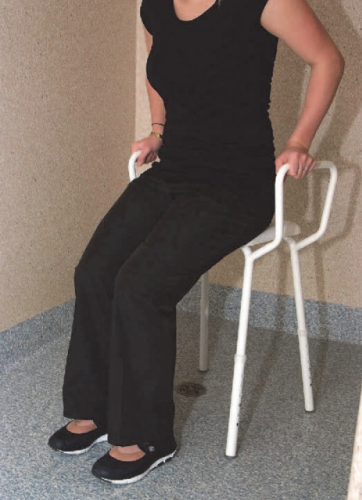Shower stools Tūru hīrere
A shower stool is a seat you can use to sit on when you have a shower. It makes showering easier and safer if you have difficulty standing for long.
Deciding if you need a shower stool
A shower stool can help you shower comfortably and safely and help you maintain your independence. They are particularly useful for those who need some support while they shower.
You might benefit from having a shower stool if you:
- experience shortness of breath
- have difficulty maintaining your balance
- have limited energy and fatigue easily
- have a condition that makes standing difficult
- want to reduce the risk of falling in the shower
- need support or assistance while showering — a stool may make it safer for you and the caregiver helping you
- are recovering from illness or injury.

What to consider when getting a shower stool
Shower stools come in many different shapes and sizes — designed to fit different people and styles of showers and shower bases.
Before buying a shower stool:
- measure the width of the shower opening
- take notice of the type of shower base and how much space is available for the legs of a shower stool
- know your weight — shower stools have weight restrictions
- consider whether you would like a shower stool with a backrest or armrests — you may not need these if you just need a place to sit and do not need more support
- decide whether you need a height adjustable stool — this will depend on your height, and the reason you are wanting a stool.
Do not use a plastic outdoor chair in your shower, as the plastic in these chairs can soften in the hot water and the chair may give way under you.
Using a shower stool
- If your stool is height adjustable, follow the manufacturer’s instructions to adjust it so your feet are flat on the floor when you sit on the stool.
- If your stool has been provided by a healthcare professional, they will ensure it has been adjusted to the right height for you.
- Make sure the stool is stable before you use it.
- If your stool has armrests, use both of them when you are sitting down or standing up. This will stop the stool from tipping.
- If other people also use your shower, ask them to put the stool back in the same position after their shower so it is always in the right place for you.
Things you should not do with a shower stool
- Do not lean back on the shower stool.
- Never stand on it.
- Do not use it if it is cracked, rusted or unstable. Get it checked by whoever supplied it.
- Do not use it in the bath or a shub. If your shower is over the bath, there are other options, including a bath board. Talk to an occupational therapist about what will be best for you.
Caring for a shower stool
To make the stool last longer, wipe it down regularly, particularly underneath.
Check its condition at least once a month:
- check for rust at joins and screw holes
- make sure the rubber stoppers are not worn
- check the adjustment buttons are all locked into place.
If you find any wear and tear, talk to the person who supplied it to you to get it checked.
Finding a shower stool
Age Concern has a directory of businesses and organisations that supply disability and mobility equipment for people of all ages.